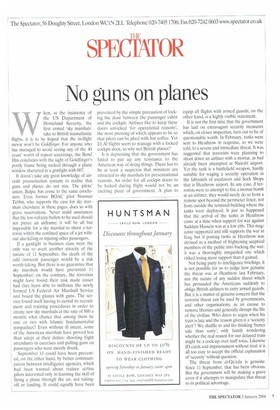o guns on planes
lyvhen, at the insistence of the US Department of Homeland Security, the first armed 'sky marshals' take to British transatlantic flights, it is to be hoped that the in-flight movie won't be Goldfinger. For anyone who has managed to avoid seeing any of the 40 years' worth of repeat screenings, the Bond film concludes with the sight of Goldfinger's portly frame being sucked through a plane window shattered in a gunfight with 007.
It doesn't take any great knowledge of aircraft pressurisation systems to realise that guns and planes do not mix. The pilots' union. Balpa, has come to the same conclusion. Even former BOAC pilot Norman Tebbit, who supports the case for sky marshals elsewhere in these pages, does so with grave reservations. Never mind assurances that the low-velocity bullets to be used should not pierce an airframe; it will be all but impossible for a sky marshal to shoot a terrorist within the confined space of a jet without also killing or injuring other passengers.
If a gunfight in business class were the only way to avert another atrocity of the nature of 11 September, the death of the odd innocent passenger would be a risk worth taking. But there is no guarantee that sky marshals would have prevented 11 September; on the contrary, the terrorists might have found their task made easier had they been able to infiltrate the newly formed US Federal Air Marshall Service and board the planes with guns. The service found itself having to curtail its recruitment and training procedures in order to create new sky marshals at the rate of 800 a month: what chance that among them lie one or two with Islamic fundamentalist sympathies? Even without ill intent, some of the American marshals have proved less than adept at their duties: shooting flight attendants in exercises and pulling guns on passengers who were merely drunk.
September 11 could have been prevented, on the other hand, by better communication between intelligence agencies, which had been warned about trainee airline pilots interested only in learning the skill of flying a plane through the air, not takingoff or landing. It could equally have been prevented by the simple precaution of locking the door between the passenger cabin and the cockpit. Airlines like to keep these doors unlocked for operational reasons', the most pressing of which appears to be so that pilots can be plied with hot coffee. Yet El Al flights seem to manage with a locked cockpit door, so why not British planes?
It is depressing that the government has failed to put up any resistance to the American way of doing things. There has to be at least a suspicion that ministers are attracted to sky marshals for presentational reasons. An order for all cockpit doors to be locked during flight would not be an exciting piece of government. A plan to equip all flights with armed guards, on the other hand, is a highly visible statement.
It is not the first time that the government has laid on extravagant security measures which, on closer inspection, turn out to be of questionable worth. In February, tanks were sent to Heathrow in response, so we were told, to a severe and immediate threat. It was suggested that terrorists were planning to shoot down an airliner with a mortar, as had already been attempted at Nairobi airport. Yet the tank is a battlefield weapon, hardly suitable for waging a security operation in the labyrinth of escalators and Sock Shops that is Heathrow airport. In any case, if terrorists were to attempt to fire a mortar bomb at an airliner, they would surely do so from a remote spot beyond the perimeter fence, not from outside the terminal building where the tanks were deployed. It just so happened that the arrival of the tanks at Heathrow came at a time when support for war against Saddam Hussein was at a low ebb. This magazine supported and still supports the war in Iraq, but if posting tanks at Heathrow was devised as a method of frightening sceptical members of the public into backing the war, it was a thoroughly misguided one which risked losing more support than it gained.
Not being party to intelligence briefings, it is not possible for us to judge how genuine the threat was at Heathrow last February, nor the nature of any sudden threat which has persuaded the Americans suddenly to oblige British airliners to carry armed guards. But it is a matter of genuine concern that the terrorist threat can be used by governments, and other organisations, as an excuse to remove liberties and generally disrupt the life of the civilian. Who dares to argue when his train is late and the reason given is a 'security alert'? We shuffle to and fro thinking 'better safe than sorry', only faintly wondering whether the real reason for our delayed train might be a cock-up over staff rotas. Likewise ID cards and imprisonment without trial: it is all too easy to accept the official explanation of 'security' without question.
The threat from al-Qa'eda is genuine. Since 11 September, that has been obvious. But the government will be making a grave error if it attempts to manipulate that threat to its political advantage.


























































 Previous page
Previous page